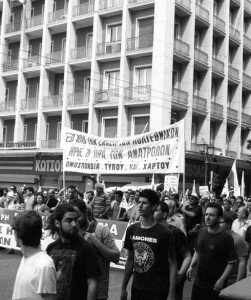 By the tens of thousands they descended on parliament in an intervention by the public against the politics of theft practiced by the Greek government and demanded by foreign creditors. They filled subway trains and side streets en route to Syntagma Square. They even filled the square itself until the three lines of riot police (always a sign of bad politics in action) unleashed tear gas for hours, but still the crowds refused to disperse.
By the tens of thousands they descended on parliament in an intervention by the public against the politics of theft practiced by the Greek government and demanded by foreign creditors. They filled subway trains and side streets en route to Syntagma Square. They even filled the square itself until the three lines of riot police (always a sign of bad politics in action) unleashed tear gas for hours, but still the crowds refused to disperse.
The outpouring of indignation was but one convulsion of a Greek patient subject to the madness and inhumanity of the neo-liberal laboratory. It was a convulsion shared across Greece, from the south on the island of Crete, to the north in the city of Thessaloniki. Out of the depths of disinterest held by Greek lawmakers, they passed the latest round of savage cuts by a near two thirds margin, ensuring further suffering and further insurrection by a people living through the controlled demolition of their livelihoods.
Those inflicting this destruction have no intention of letting the carnage be contained. They have the opposite intention. With Greek politicians gutting the wages and living standards of Greek workers, so too must Portuguese, Italian, and Spanish politicians prove their own devotion to the Troika (the European Commission, the European Central Bank and the International Monetary Fund) by marching their citizens into the same abyss. But their fanaticism will be their undoing. Having slashed wages in half, the Troika has made Greece unliveable for its residents. When a government makes a country unliveable, its people will respond by making that country ungovernable. This toxic equation won’t be unique to Greece.
With the prospect of wages being slashed in half as they have been in Greece, what other reasons are needed for Spaniards, Italians and Portuguese to fill the squares and paralyze the streets with a show of their strength in numbers? “What the parliament does, the street can undo” isn’t just a slogan. The streets can be a rival institution to parliaments dominated by members who confuse their seats for a popular mandate to rule on behalf of the bankers. No such mandate has been given. The need for the streets to restrain parliament becomes all the more urgent for countries like Italy and Greece where democracy has been suspended and unelected technocrats serve as prime minister.
The protests this week demonstrate to me that Greeks have nearly assembled a street power to rival that of parliament. The youths and unions who have been fighting all along are increasingly being joined by the middle class and business owners. This critical mass of Greeks will soon embark on the task of undoing the damage imposed upon them by their Troika government.
Just as the tide of austerity starts in Greece and washes over Italy and the Iberian peninsula, so must a Greek revolt ignite its way West. If people in Spain, Portugal and Italy delay this task of dismantling Troika rule, it only gives them more damage to undo later. This is damage that can be avoided by joining the battle being fought by Greeks today instead of leaving the battle to be fought later, and in isolation, by each individual country.
Last summer, Greeks took to Syntagma Square, joining the struggle of tens of thousands of Spaniards in Puerta del Sol. Now, Puerta del Sol and all squares beyond and in-between must reinforce the crowds who have assembled in Syntagma. The Troika officials and their henchmen in parliaments must be exiled from power. It’s the same demand that came from Buenos Aires over ten years ago: “Que se vayan todos – They all must go!”
By David Ferreria
